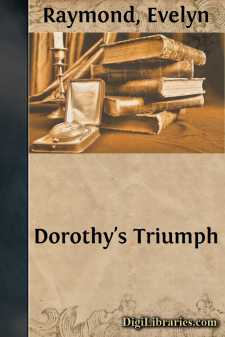Categories
- Antiques & Collectibles 13
- Architecture 36
- Art 48
- Bibles 22
- Biography & Autobiography 813
- Body, Mind & Spirit 142
- Business & Economics 28
- Children's Books 15
- Children's Fiction 12
- Computers 4
- Cooking 94
- Crafts & Hobbies 4
- Drama 346
- Education 46
- Family & Relationships 57
- Fiction 11828
- Games 19
- Gardening 17
- Health & Fitness 34
- History 1377
- House & Home 1
- Humor 147
- Juvenile Fiction 1873
- Juvenile Nonfiction 202
- Language Arts & Disciplines 88
- Law 16
- Literary Collections 686
- Literary Criticism 179
- Mathematics 13
- Medical 41
- Music 40
- Nature 179
- Non-Classifiable 1768
- Performing Arts 7
- Periodicals 1453
- Philosophy 64
- Photography 2
- Poetry 896
- Political Science 203
- Psychology 42
- Reference 154
- Religion 513
- Science 126
- Self-Help 84
- Social Science 81
- Sports & Recreation 34
- Study Aids 3
- Technology & Engineering 59
- Transportation 23
- Travel 463
- True Crime 29
Dorothy at Oak Knowe
by: Evelyn Raymond
Description:
Excerpt
CHAPTER I
ON THE ROAD TO OAK KNOWE
“This way for the Queen!”
“Here you are for the Duke of Connaught! Right this way!”
“Want the Metropole, Miss?”
“Room there, stupid! She’s from the States—any fool could see that! I’m from your hotel, little lady, the American. Your luggage, Miss, allow me?”
If Dorothy’s hands hadn’t been too full, she would have clapped them over her ears, to drown the cries of the hackmen who swarmed about her as she stepped from the train at the railway station in Toronto. As it was, she clung desperately to her bag and shawlstrap, which the man from the American hotel seemed bound to seize, whether or no.
But her heart sank and it was a forlorn little girl, indeed, who looked anxiously around seeking some face on which might be a smile of welcome. But nobody paid any attention to her, except the obstreperous hackmen, and in a sudden fright she let fall the tears she had so bravely kept back until then. It had been a long and lonely journey, but she had been assured that she would be promptly met and cared for when it ended. Now, amid all the throng of travelers and those who awaited them, not one was looking for a “dark haired girl in navy blue” and the tears fell faster as she cried aloud:
“Oh! what shall I do! What shall I do!”
Even the hackmen had forsaken her in pursuit of other, more promising patrons. The short autumn day was at its close and in the growing darkness her fright increased and her usual common sense left her. But, as she spoke, a hand was laid upon her shoulder and a rather gruff voice demanded:
“Why, little stranger, what’s a-troublin’ ye?”
Dorothy winked her tears away and looked up into the face of an old man, whose gray beard swept his breast while his head was entirely bald. He wore a long blue smock, carried an ox-goad in one hand and a canvas bag in the other. He looked as kind as he was homely and Dorothy answered quickly:
“I’m lost, I guess. Or forgotten, and that’s just as bad! I—I—”
“Lost? Right here in this town? Well, that couldn’t hardly be. Though I own it’s a biggish place. But if you be, I’ll see to it that you get found again, immediate. First start—who be ye?”
“I’m Dorothy Calvert, from Baltimore. I came to the Oak Knowe School for Girls. Somebody was to meet me. Nobody has and—and—I don’t know what to do.”
John Gilpin whistled and exclaimed:
“No! Never! I saw at a glance you was no Cannuck! The little maids we raise in our Province have redder cheeks ’an yours. An’ we don’t let ’em go traversin’ round the universe without their mothers or leastways nurses to look after ’em. But bless my soul, you’ve fell into safe hands. I know old Oak Knowe well. No better school in the whole Empire nor that. Moresomever, there’s been some miscarry betwixt your folks and the Lady Principal or she’d never let you come to this pass. But my road lies same as yours. I’ll just step-an’-fetch my oxen and head ’em straight for home. We’ll get to the School in next to no time. Leastways, betwixt now and bedding-bell—they ring it about half-past nine.”
“Is it so far? Why, it must be hours till then!”
At the cheerful sound of this old teamster’s voice Dorothy forgot her fear. She didn’t stop to reflect that she should have waited quietly in the station till somebody called for her, nor that she might have telephoned to her teachers to announce her arrival. All she realized was that here was a friend in need and that he was a quaintly interesting person.
“’Tis a matter of some miles, lassie, and my old oxen are no electric tram. Slow and sure’s their motto and what’s an hour, more or less, in a little girl’s lifetime? You got a box?”
Dorothy glanced at the rug and magazine, tightly strapped together, and at the handbag she had set down upon the platform and replied:
“No, Mr.—I don’t know your name yet—I haven’t now....












